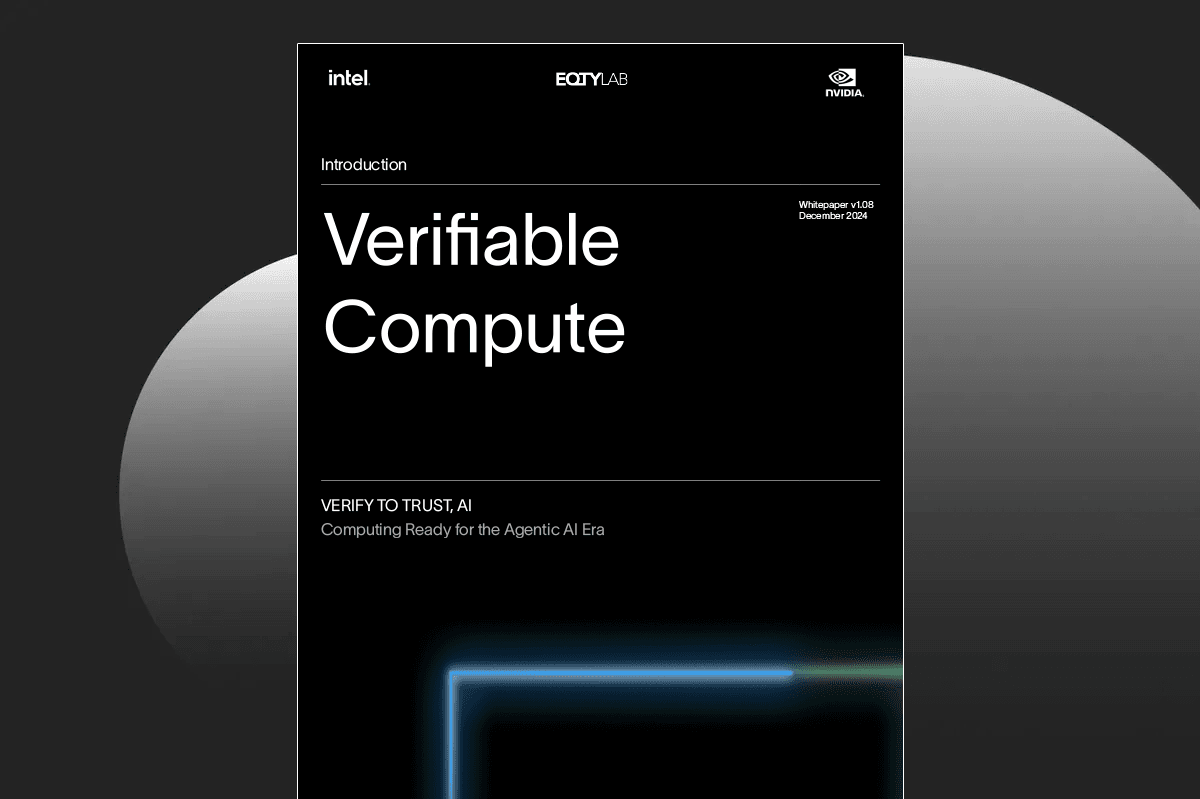Updates
White Paper: Verifiable Compute
EQTY Lab partners with Intel and NVIDIA to create an immutable chain of trust for enterprise AI.

Download our Verifiable Compute white paper.
Key Takeaways:
EQTY Lab's Verifiable Compute, built on Intel and NVIDIA hardware, creates an immutable record of AI computations by cryptographically signing every step of the process—from data ingestion to model training and inference.
Organizations can now demonstrate regulatory compliance while protecting sensitive data and intellectual property, solving a critical challenge for regulated industries.
Verifiable Compute provides real-time, cryptographic proof of AI operations, establishing a new standard for transparency in autonomous systems.
Confronting AI's Trust Deficit
As artificial intelligence reshapes industries and transforms business operations, a fundamental question emerges: How can we trust the AI systems we rely on? With 91% of organizations already facing supply chain attacks on traditional software systems, the stakes are even higher for AI, where models and autonomous AI agents operate with unprecedented levels of independence.
The challenge isn't just about securing individual components of an AI workflow – it's about establishing trust across the entire AI supply chain. Verifiability and transparency are particularly crucial as AI systems become more complex and autonomous, operating across distributed environments with limited oversight.
Introducing Verifiable Compute
At EQTY Lab, we're introducing a novel solution: Verifiable Compute. Working in collaboration with Intel and NVIDIA, we've developed a digital notary system that cryptographically signs every AI computation at runtime, providing an immutable certificate of authenticity. This solution leverages Intel's latest Trust Domain Extensions (TDX) and NVIDIA's Hopper architecture to create a hardware-rooted chain of trust that extends from silicon to software.
Download our white paper, "Verifiable Compute: Computing Ready for the Agentic AI Era," to learn how organizations can implement these capabilities today, leveraging the latest advances in hardware security and cryptography to build AI systems that aren't just powerful, but provably trustworthy.
Transforming Industries Through Verifiable AI
The implications of Verifiable Compute are far-reaching. From ensuring the authenticity of training data to verifying model inference and benchmarking, Verifiable Compute creates new possibilities for collaboration, compliance, and innovation in AI. Financial institutions can now prove their models maintain regulatory compliance without exposing sensitive data. Healthcare providers can demonstrate the integrity of their AI diagnostics while protecting patient privacy. And technology companies can verify the performance of their AI systems while safeguarding proprietary information.
Building on Hardware Innovation
The technical foundation of our solution builds upon the latest advances in confidential computing hardware. Intel's TDX technology creates a secure enclave at the CPU level, protecting sensitive workloads with hardware-level isolation, while NVIDIA's H100 GPUs introduce the industry's first confidential computing capabilities for AI acceleration. We've extended these capabilities by developing a unique notary subsystem that bridges these secure environments, creating cryptographically verifiable proofs of computation that survive long after the original compute session ends. This creates, for the first time, a complete chain of trust from data ingestion through model training and inference, all backed by hardware-based security guarantees.
A New Paradigm for AI Trust
As AI continues to evolve, we believe verifiability will become as fundamental as security itself. Our approach transforms how organizations can validate AI processes. Rather than relying solely on black-box systems or after-the-fact auditing, Verifiable Compute provides real-time, cryptographic proof of what data goes into an AI workflow, what code is executed, where it runs, and how it's governed. This breakthrough enables organizations to prove the integrity of their AI systems while maintaining confidentiality – a crucial balance in today's privacy-conscious landscape.